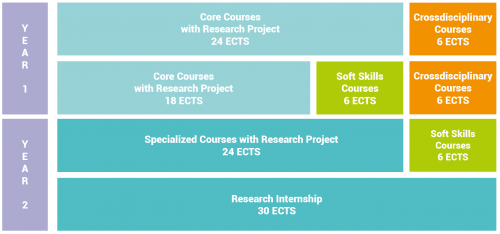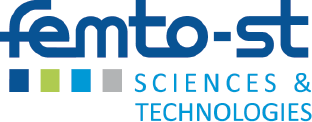Innovation through
Physics and Engineering
Innovation through Physics and Engineering
Innovation through
Physics and Engineering
Innovation through Physics and Engineering
The proposed master program aims at training students in fundamental, both theoretical and experimental, physics with applications in photonics, nanotechnology, and quantum technologies. This combination, innovative at the level of a master program, is well aligned with priority investments in research at the European and international level, with thematic areas of growing demand for highly trained students, able to embark in a doctoral programme. This two-year master programme, fully taught in English for international students, is part of the Graduate School of Sciences of the University Bourgogne Franche-Comté (UBFC). It consists in both lessons and research project (3 month during the first year) / internship (5 months during the second year). This training program will be based on the internationally highly recognised research activities of the underlying laboratories ICB, Dijon and FEMTO-ST, Besançon.
This two-year master programme, fully taught in English for international students, combines macroscopic with nano- and quantum-scale topics. The programme aims at developing and improving students’ skills in fundamental optical physics, optical fibre communications, optoelectronics, laser technologies, ultrafast femtosecond optics, quantum information science, nanophotonics, nano-microscopy and nano-biosciences. This combination, innovative at the level of a master program, is well aligned with priority investments in research at the European and international level, and with thematic areas of growing demand for highly trained students.
The master programme is part of the Graduate School of Sciences of the University Bourgogne Franche-Comté (UBFC), Engineering and Innovation through Physical Sciences and High-technologies (EIPHI), which also includes a doctoral programme in the same topics.
Almost half of the programme is devoted to research project (3 month during the first year) & internship (5 months during the second year) in an international research team, leading to a master thesis aiming at the standards of a research article. This training program will be based on the internationally highly recognised research activities of the underlying laboratories ICB, Dijon and FEMTO-ST, Besançon, both having high international visibility in photonics, quantum technologies, nanotechnology and Engineering Sciences with researchers of high reputation.

| Master 1 Fall Semester | Master 1 Spring Semester |
Solid-state physics and soft matter Quantum Physics Lasers Signal Processing Numerical Methods Research Project | Non-Linear Optics Fiber Communications Guided Optics and Opto-electronics Micro Nano Fabrication & Clean Room Microscopies Research Project |
| Master 2 Fall Semester | Master 2 Spring Semester |
Ultrafast Optics Advanced Photonics Quantum Technologies Atomic & Molecular Dynamics Nano Bio Science Laboratory Works Research Project | Research Internship hzsrthsrkgiklglggjkgjthsrthsrths |


Photonics is a very dynamic industrial sector in Europe and holds the potential for huge market growth. It has a substantial leverage effect on the European economy and workforce: 20-30% of the economy and 10% of the workforce depend on photonics, directly impacting around 30 million jobs.
This master program offers intensive educational activities based on research activities of photonics, including nanophotonics and quantum technologies. It focuses on fundamental & applied research mainly targetting PhD programs, which will lead to recruitment in academia or in industry.
A need of master degree students in the field of photonics & nanotechnologies, including specialties in quantum technologies boosted by the European flagship in Quantum Technologies (launched in 2018), able to embark on a PhD program both in academia & industry will strongly increase in a near future.
The master’s Alumni Office helps alumni keep in touch with each other and organises alumni events.
Students eligible to the master program PPN must have obtained a degree equivalent to or higher than a Bachelor’s degree (3 or 4 years degree) of Science or its equivalent. Background knowledge in general physics, optics, electromagnetism, and quantum physics is mandatory. Courses waivers can be given depending on your former undergraduate program content. Candidates must have very good academic qualifications and a very good practice of English.
During the first year, students have to pass the examinations associated with the Master 1 (60 ECTS credits) in order to proceed to the second year, Master 2 (60 ECTS), including research project and master thesis (33 ECTS).
Scholarships will be awarded each year to high quality foreign students.
The two-year master program takes place at the Université Bourgogne-Franche Comté, located in the scenic cities of Dijon & Besançon. The former capital city of the Duchy of Burgundy, Dijon is a medium-size French city, where you can enjoy a vibrant and active cultural life, as well as quick getaways to the countryside and the world famous neighbouring vineyards of the so-called “Golden coast” (city center, climates of the Burgundy vineyard, and gastronomy listed as world heritage sites in Dijon by Unesco). Life in Dijon is very affordable and accommodation easily accessible. The city is well-equipped with modern tramway and bus lines, making commuting between any place in Dijon and the University easy and convenient. Dijon is also host of several top-level professional sports teams (football, basketball, handball, rugby…), while also offering a large diversity of sports facilities.
Contact: Aurélien Coillet